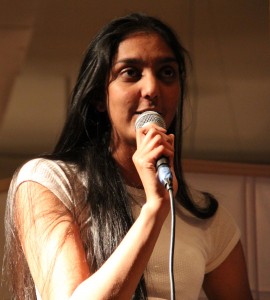With a bright light shining in my face onstage, I could barely see the 150 people sitting in front of me. I could only sense the audience’s presence with my ears, as if I were a bat inside a dimly lit cave trying to figure out what my next move would be. I hold the microphone and say, “A recent science study stated that people are less afraid of hurricanes with female names — except for the guy who has a wife named Katrina.”

Kasha Patel (’12) on her 23rd birthday when she hosted her first science comedy show, “This Scientist Walks Into a Bar.”
I continue, “I think these female hurricanes are just not named appropriately. If there was a hurricane named ‘Serena Williams’ arms,’ people would be freaking out.”
The bar was filled with scientists and science writers, many who worked at top science research institutions around Washington, D.C., such as NASA and the National Institutes of Health, a much different crowd than I usually perform for. Stand-up comedy is daunting, but performing science-themed stand-up comedy for people who dedicate their lives to researching and learning science is perhaps even more intimidating.
Two years after graduating from Wake Forest with a chemistry degree, I’ve been frequenting bars and clubs telling jokes to strangers several times a week. I have heard dirty jokes, clean jokes, but rarely do I hear science jokes. Even more rarely do I hear an appreciation for science jokes from the non-science-minded. One time, an audience member booed me and said, “That’s a science joke.” The heckling was bad, but the repetitive silence after my science jokes was worse. Disillusioned, I shied away from science humor. Instead, I focused on my jokes about “filling the unknown demand for Indian female comics from West Virginia.”
"But this is exactly how I wanted to spend my 23rd birthday. Excited. Nervous. Trying something new."
I love my non-science jokes. They have earned me spots in comedy festivals in New York City and Chicago and have repeatedly impelled strangers to compliment me. But, it felt weird that I didn’t do science jokes. During the daytime, I work as a science writer for NASA where I write about abnormal trends in the ozone layer, how air quality has improved over the last decade in the United States and how climate change will alter the annual life cycles of plankton, the base of the oceanic food chain. By not writing science jokes, I felt like I was ignoring this whole other part of my life.
Last July, I organized a science comedy night — where only science jokes are allowed — with help from the D.C. Science Writers Association. This night — the first of its kind in D.C. that I knew of — sparked additional science comedy nights and presentations about using humor to convey science.
People often ask me how I became a NASA writer by day and stand-up comic by night. I would be remiss if I didn’t say that Wake Forest had helped me broaden my scope of career choices. Entering Wake as a freshman, my expectation — as was everyone’s who knew me — was to become a doctor. Then there were moments when I thought, “Wait, why can’t I do something else?” Why can’t I write science articles for the Old Gold & Black or Wake’s office of communications? Why can’t I use my chemistry background to become a writer? Why can’t I create a night for only science jokes? I realized that the possibilities aren’t just the ones that are laid out before me. At Wake, I learned how to stand up for my ideas — pun intended.
After receiving her chemistry degree at Wake Forest, Kasha Patel (’12) of Washington, D.C., obtained her master’s in science journalism degree at Boston University. She works as a science writer at NASA’s Goddard Space Flight Center. Her comedy experiences and schedule are at kashapatel.com/comedy. Find her jokes on Twitter @KashaPatel.


